Are you a home gardener looking to boost the nutrient content in your soil by adding fertilizers?
If so, you should know that granular and other dry fertilizers must dissolve in water before your plants can absorb them.
Dissolving the granular fertilizer in water makes it easy for the roots to reach and absorb the nutrients, thus, promoting growth.
However, it can take as long as 2 days or 2 weeks for the fertilizer to dissolve. However, this depends on a few factors.
How Long Does It Take For Granular Fertilizer To Dissolve?
The time it will take for your fertilizer to dissolve will depend on the type of fertilizer.
Granular fertilizers are mainly slow-release fertilizers. However, some product formulas are quick-release.
A slow-releasing fertilizer may take up to 2 weeks to fully dissolve in the soil, but a quick-release type will dissolve entirely in less than 48 hours.
The slow-release granular fertilizers have a coating on them. This outer layer delays the solubility and hence the nutrient release.
Unlike powder and liquid fertilizers that dissolve quickly, granular fertilizers take time and steadily release their nutrients into the soil.
How Much Time Do Fertilizers Need To Be Absorbed?
Generally, fertilizers can take up to 2 weeks before they start working.
Regardless of the type, all fertilizers work the same. They dissolve in the soil into a form that plant roots can easily absorb.
Therefore, it is safe to say that plants will only absorb nutrients packed in fertilizers once they fully dissolve.
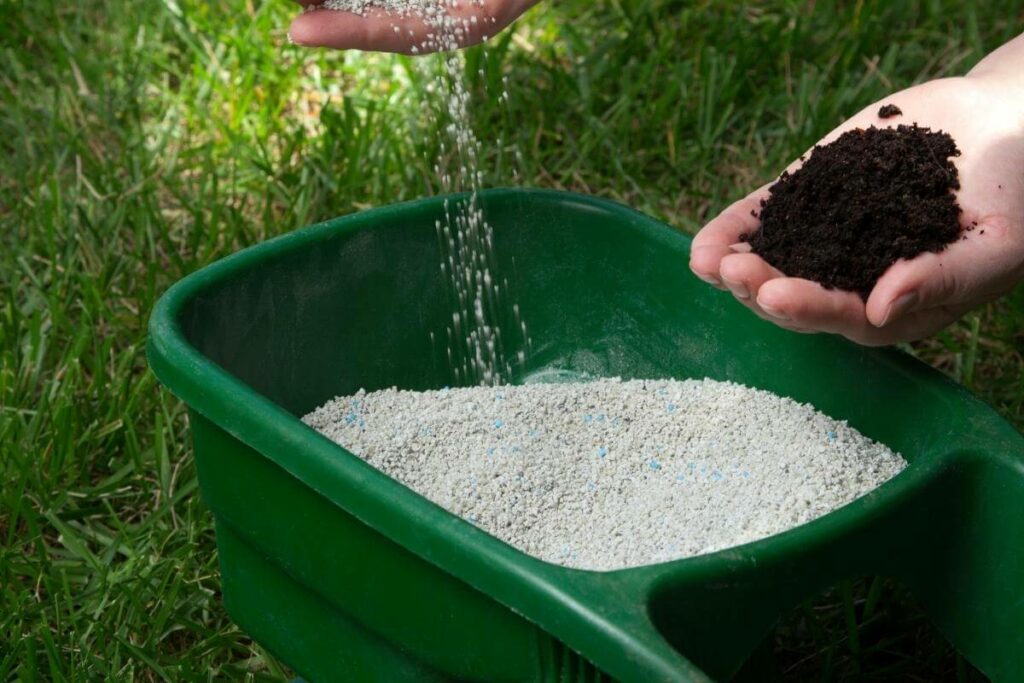
Therefore, liquid fertilizers have the shortest wait time, while organic fertilizers have the longest. Powder and granular fertilizers also take time to dissolve and be absorbed by the plants.
Organic fertilizers depend on microbial activities to break down into forms plants can take for nourishment.
However, the fertilizer absorption rate will depend on a few factors.
These include the following.
Temperature
Warmer temperatures encourage solubility.
This means granular fertilizer will dissolve faster in warm weather than in cold seasons.
As a Result – Plants will tend to absorb nutrients faster when it is hotter than when it is cold.
Rainfall
When you add your granular fertilizer after the rains, it dissolves faster, and plants absorb it sooner.
However, you should avoid applying your fertilizer while it is raining.
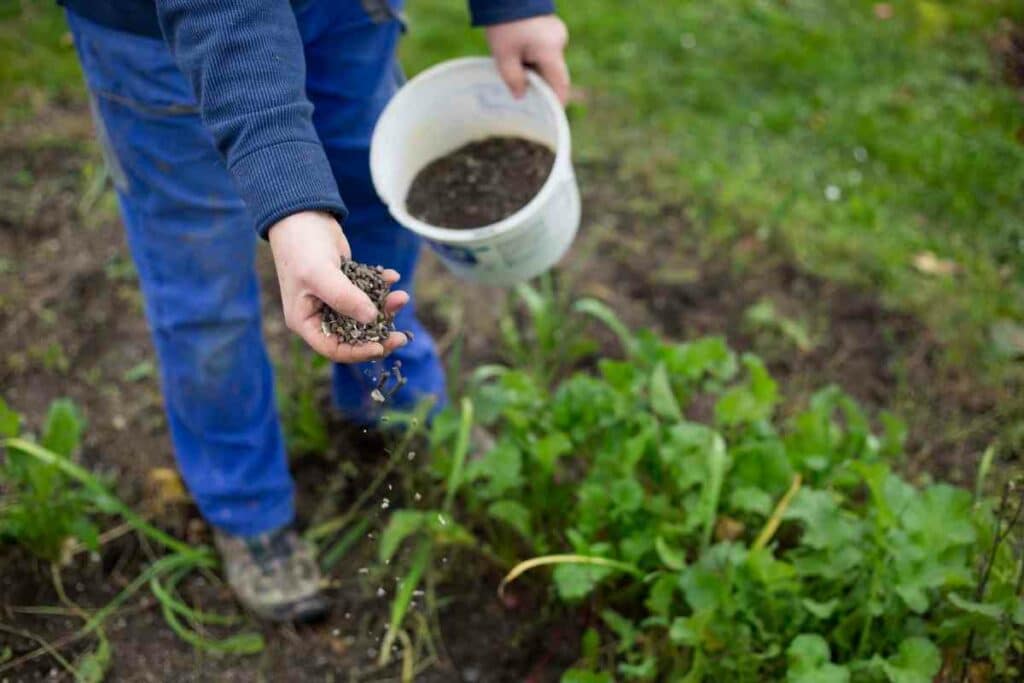
This is because the rains will wash down the fertilizer, leaving the plants without enough nutrients to absorb.
Also, during dry seasons, it may take longer for the plants to absorb the nutrients due to the lack of water in the soil.
Supernutrition in the soil
A plant’s nutritional composition can affect the uptake of another nutrient.
So, if one nutrient is in excess, the plant develops physiological obstacles that slow down nutrient absorption.
As a result, the fertilizer absorption from the soil takes longer than anticipated.
Do You Need To Water Granular Fertilizers?
Most granular fertilizers come in the form of a pellet.
This means that you must water the granular fertilizer to be effective.
The water breaks down the fertilizer and carries it down to the plant’s roots for absorption.
Once you apply your granular fertilizer to your plants or lawn, it will need water to work.
The water could be from rainfall or your garden hose.
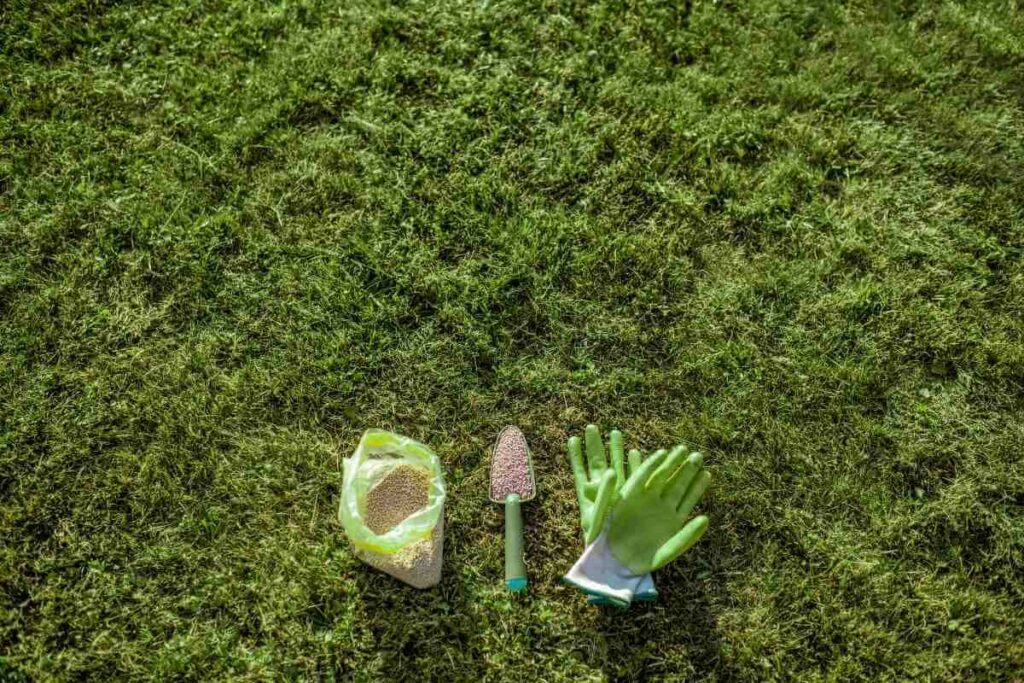
The water helps in the decomposition of the fertilizer for easier absorption.
In some cases, failing to water your fertilizer can result in fertilizer burns.
Remember, there are many types of granular fertilizers:
- Slow-release fertilizers– these fertilizers release their nutrients into the soil slowly. Usually, they have a coating that helps them regulate their nutrient release. By applying water, you activate the layer, gradually releasing nutrients into the soil.
- Uncoated fertilizers are quick-releasing granular fertilizers with a lifespan of about 2-4 weeks. Too much water can lead to leaching, robbing plants of their essential nutrients. So, you need to add a controlled amount of water to activate the fertilizer.
After applying your granular fertilizer, you should water your plants within 24 hours.
After the initial watering session, you can wait 2-3 days before adding water.
This way, you can prevent nutrient leaching due to overwatering the plants.
Is Granular Fertilizer Better Than Liquid Fertilizer?
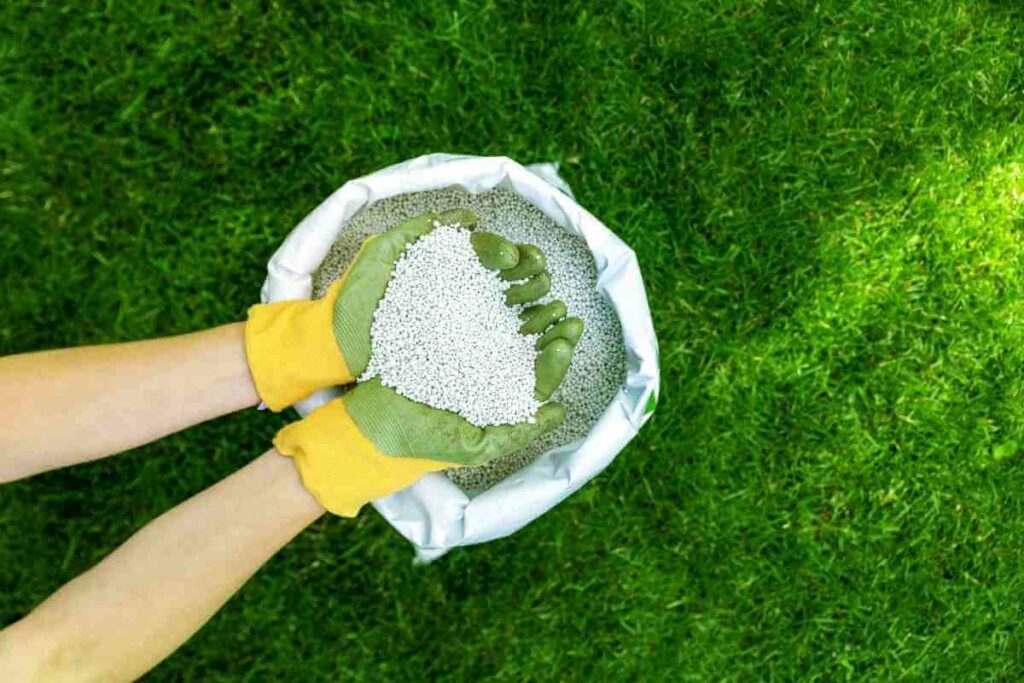
Although all fertilizer works the same, there are some significant differences between liquid and granular fertilizers.
They come with different pros and cons.
| Pros | Cons | |
|---|---|---|
| Liquid Fertilizers | – The fertilizers are quick-acting – It is easier to apply the fertilizer uniformly to plants – Plants absorb these fertilizers more efficiently – The delivery method is faster – Finally, liquid fertilizers are easy to store as they come in small packages. | – Liquid fertilizers are costlier than granular fertilizers – Due to their high salinity, the tools for applying the fertilizers are damaged easily – Also, if used under high temperatures, the high salinity of liquid fertilizers can burn plant leaves – Plants only take up a small portion of the nutrients. The soil loses the rest of the nutrients through volatilization and leaching. |
| Granular Fertilizers | – The slow-releasing pellets will serve your plants for up to 9 months – When bought in bulk, granular fertilizer is cheaper – They are easier to store because they do not salt out in the cold – Granular fertilizers are more efficient for heavy pre-planting applications. | – Their high salt content can burn plant leaves. – Some immobile nutrients like phosphorous cannot get close to the roots for absorption unless you add water to carry them – Non-uniformity in feeding plants since each granule carries a different amount of nutrients – Labourous application |
Liquid fertilizers are nutrient concentrates.
To apply them to plants, dilute them in water until you reach the required DSL. The application method for liquid fertilizers can vary from pressure types to non-pressure types.
The most common liquid fertilizers are a combination of nitrogen, phosphorous, and potassium.
Some include nitrogenous, anhydrous liquid ammonia, concentrated urea, and ammonium nitrate solutions.
Dry fertilizers mostly come in the form of granules. Usually, the nutrient composition of a bag of dry fertilizer will depend on the blend created.
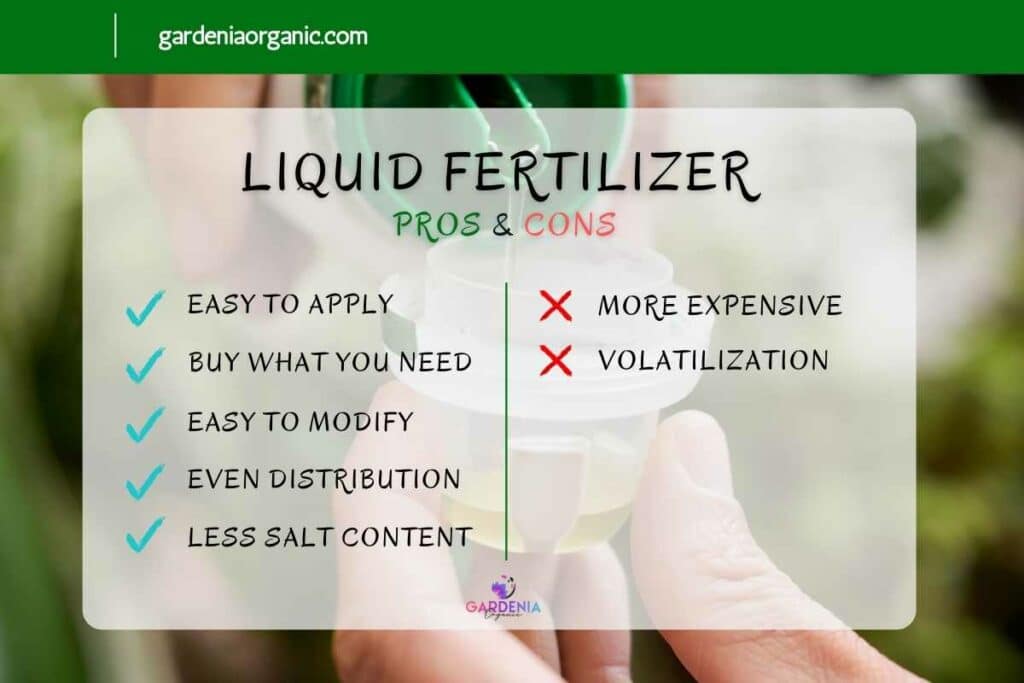
Usually, the granular fertilizers are added at a shallow depth. Adding the fertilizer directly to the plant could burn them, causing irreversible damage.
Each type of fertilizer has its pros and cons. That is why each would be suitable for different applications.
For Instance – Liquid fertilizer is the best option if you want to revive your plants quickly.However, granular fertilizer is better if you prepare your farm pre-planting. Also, granular fertilizers are better if you want to keep your plants’ nutrient supply open for a long time.
Does Granular Fertilizer Wash Away?
If you are using slow-release granular fertilizer, then it is not easily washed away.
This is because the pellets do not dissolve easily in water.
So, rather than washing away, rain helps activate the fertilizer into slowly releasing nutrients into the soil. So, water the fertilizer with your garden hose if there is no rain.
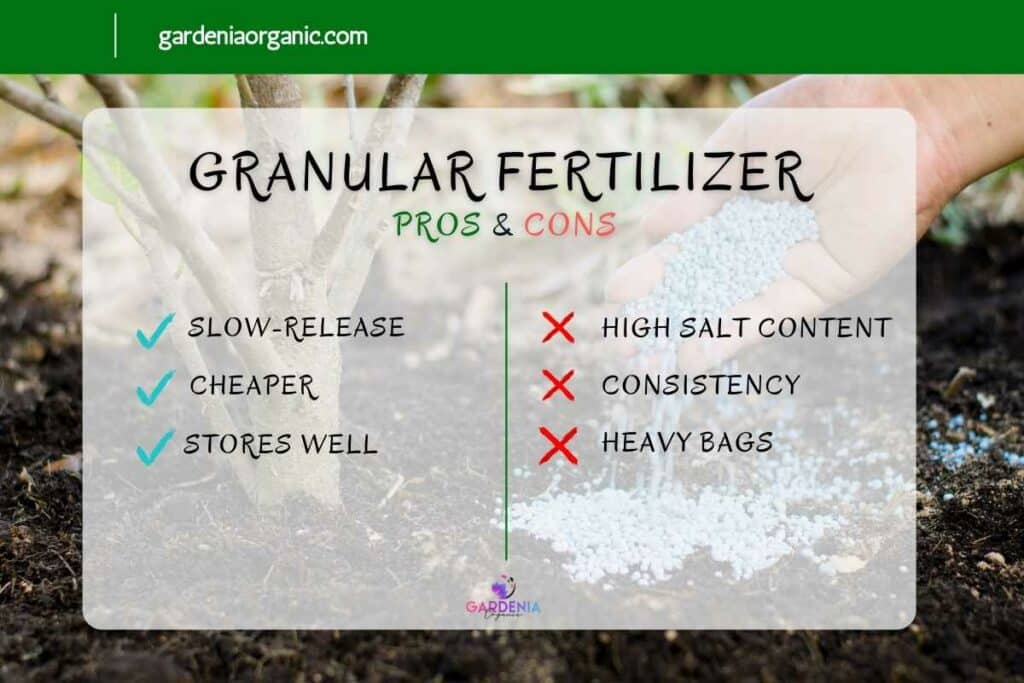
However, that benefit is only viable if you are experiencing little rain.
When heavy and prolonged rains hit you, the granular fertilizer will most likely be washed away by the water.
Also, if you add too much water frequently to your garden, you will wash away the granular fertilizer.
Frequently Asked Questions
How long will your plants benefit from a single addition of granular fertilizer?
Depending on the fertilizer’s formula, granular fertilizer can last from a few weeks to several months in the soil. Slow-releasing fertilizers last longer compared to regular uncoated fertilizers.
How often should you water in granulated fertilizer?
After applying the fertilizer, you should water it within 24 hours. After the first hose down, wait 2-3 days before adding more water.
Remember, do not overwater your plants; otherwise, your nutrients will leach into the soil, leaving your plants without essential nutrients.
Conclusion
Fertilizers support healthy plant growth and supply nutrients for proper development. These fertilizers come in different forms, with the main ones being liquid and granulated.
If you add granulated fertilizer to your plants, you should follow up with some water to activate the nutrient release from the pellets. Also, water helps carry some immobile nutrients to the roots for absorption.
You can also dissolve the granular fertilizer in water for more effortless and uniform application. The fertilizer will dissolve fully in a few hours or days, and the application will be more consistent and faster.
